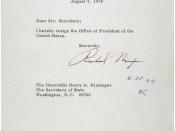The Federalist Papers in this section are about the roles of the President. Included in these roles is the president's right to pardon. There have been several instances where a president has used his right to pardon, whether it was right or not. Generally speaking, for cases of principle, the president should have the "assent of one, or both, of the branches of the legislative body" (Hamilton, 423).
As president, he has the right to "grant reprieves and pardons for offenses against the United States except in cases of impeachment" (422). In exercising this right, he must be careful because it could sometimes be "contested in relation to the crime of treason," (423) which is why he is urged to be in agreement with either the House of Representatives, the Senate, or both.
In August of 1974, Richard Nixon became the first president to resign from office. "Vice President Gerald Ford assumes the country's highest office" and will "later pardon Nixon of all charges related to the Watergate case" (washingtonpost.com).
The Watergate Scandal began when five men broke into the headquarters of the Democratic party. Carrying walkie-talkies with them, they were linked to the Republican National Committee. Soon everything related to the scandals or traceable to CREEP and the White House staff involving the 1972 election became part of Watergate. On August 9, 1974, Ford resumed the presidency as the first non-elected president naming the first non-elected Vice President, Nelson Rockefeller. On September 8, 1974, Ford granted Nixon a "free, full, and absolute" pardon "for all offenses against the United States which he, Richard Nixon, has committed or may have committed or taken part in..."(super70s.com). When Ford pardoned Nixon, I do not believe that it was as much an act of forgiveness as it was a power issue. Ford was...


